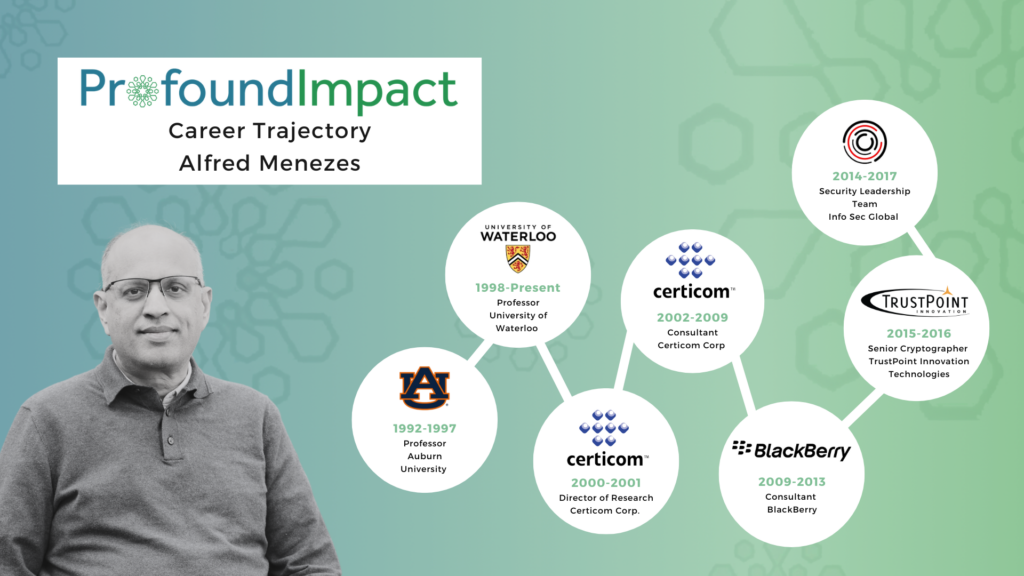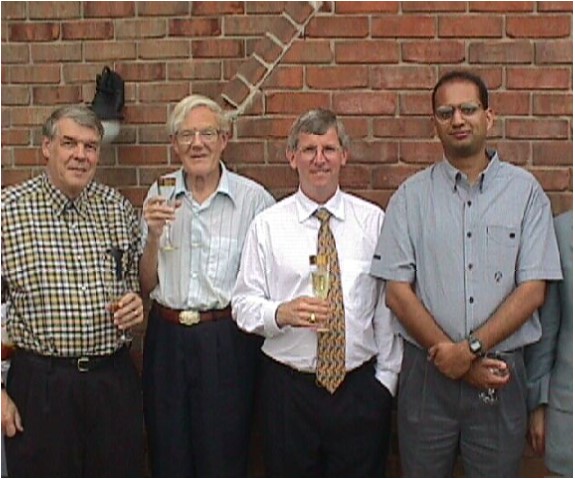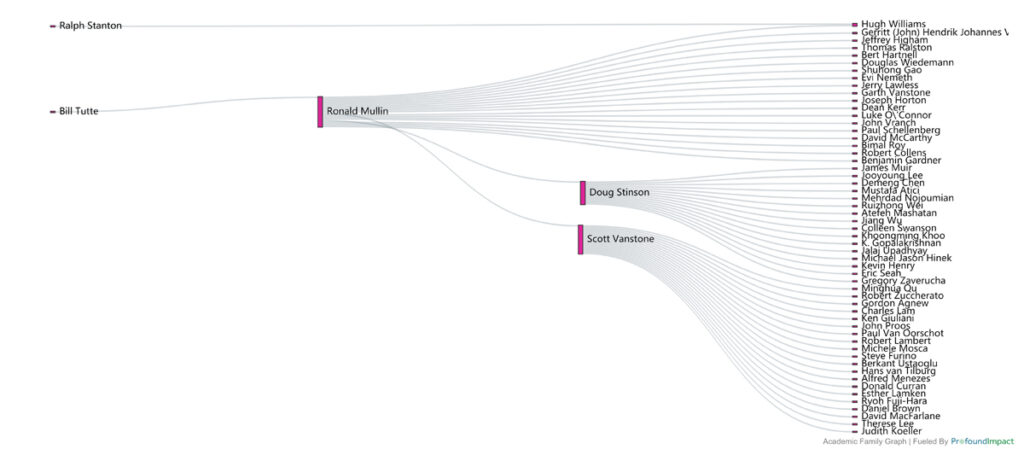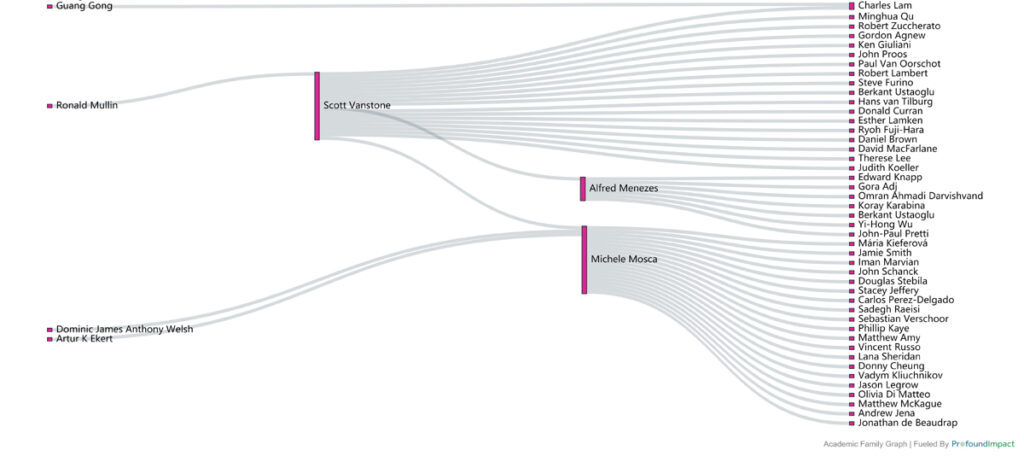Alfred Menezes

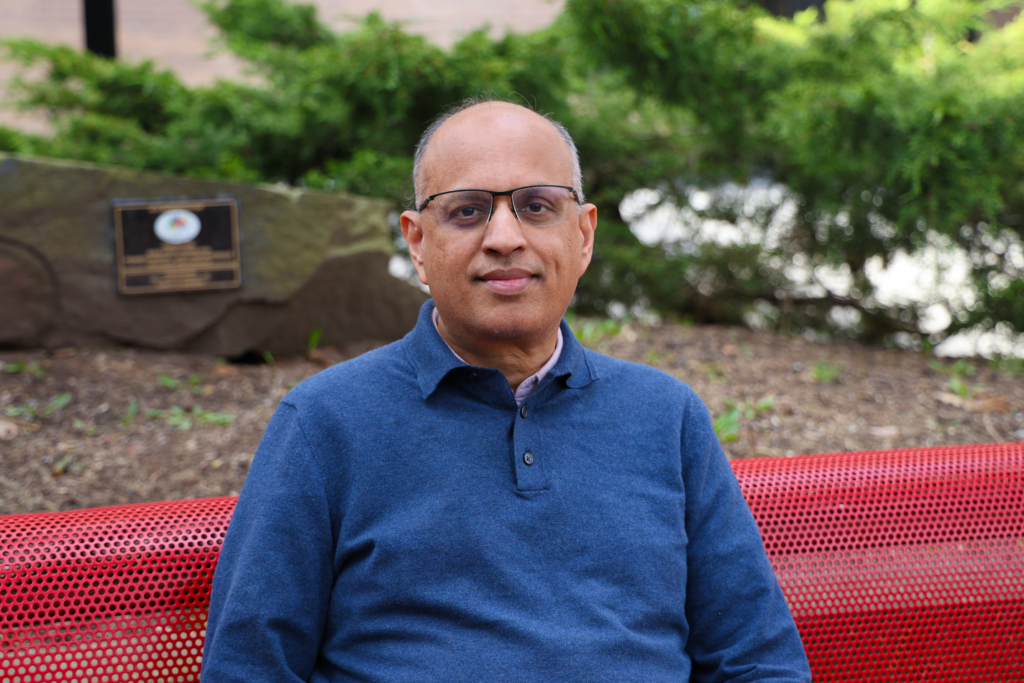
Professor, Faculty of Mathematics, University of Waterloo
In 1983, as a Grade 13 high school student at St. Aquinas Secondary School in Bramalea, Ontario, Alfred Menezes’ dream was to attend the University of Waterloo. Born in Tanzania and raised in Kuwait, Alfred came to Ontario to live with his aunt and uncle for his final year of high school, with plans to attend university in Canada.
Although he had never used a computer, Alfred and his parents had been assured that a career in computer science would be the path to a good future. “I had good teachers in high school, liked math a lot, and was good at it,” notes Alfred. Waterloo had acquired a reputation as an emerging school for computer science, so he applied to and was accepted by the Faculty of Mathematics.
A visit to Alfred’s math class by Professor Scott Vanstone from the university’s Department of Combinatorics and Optimization in the Faculty of Mathematics was a defining moment in his academic and career path. “Scott talked to us about St. Jerome’s College at UW and gave an informal lecture on cryptography. Before he left, he shook my hand. His visit made a major impression on me – I signed up to live and study at St. Jerome’s right away. I would otherwise never have dreamt of doing so.”
Scott was on sabbatical during Alfred’s first year at St. Jerome’s, but Alfred ran into him again at the beginning of his second year, while lined up to register and pay tuition fees. “I saw Scott, but was too shy to speak to him, so I turned away. Scott stopped and said “Hi Alfred, how’s it going?” – remembering me and my name from his visit to my high school 18 months earlier!”
In Alfred’s third year of study, Scott arranged an undergrad research term for him – the beginning of his research career. “I didn’t have other plans after graduation, so I did a Master’s degree, with Scott as my academic supervisor. I wanted to continue to live in Canada, so went on to complete a PhD, working again with Scott. My work on cryptography progressed from a summer undergrad project to my research focus.” His main areas of research are Elliptic Curve Cryptography (ECC), provable security, and related areas.
Alfred’s first academic position was as a professor at Auburn University in Alabama. When Scott Vanstone and Doug Stinson were awarded research chairs in 1998, creating additional research positions at the University of Waterloo, Alfred returned as a faculty member at his alma mater.
“The field of cryptography is fast-moving. My academic work and interaction with Scott, who had co-founded Certicom with UW faculty members Ron Mullin and Gord Agnew, introduced me to the industry,” says Alfred. In addition to research and teaching, Alfred has worked as a consultant for Certicom, BlackBerry, InfoSec Global, and TrustPoint Innovation.
While at the University of Waterloo, Alfred co-founded the Centre for Applied Cryptographic Research and served as its Managing Director. He is currently a member of the Cybersecurity and Privacy Institute. In 2001 he won the Hall Medal of the Institute of Combinatorics and its Applications.
Alfred’s book, Elliptic Curve Public Key Cryptosystems, published in 1993, was the first book devoted entirely to ECC. He co-authored, with Scott Vanstone and Paul van Oorschot, the widely-used reference book Handbook of Applied Cryptography.
Alfred’s focus for the last several years has been on teaching. “I have always loved teaching and have taught cryptography 19 times during my tenure at the University of Waterloo.” The very popular course, the largest fourth-year course in the Faculty of Mathematics, has attracted 250 students for each of the last seven offerings. Alfred’s current challenge is to move the class online in order to reach a broader audience.
“I will be retiring from the university next August, and have decided to become a YouTuber!” says Alfred. He started producing video classes during the pandemic and found that using good audio and camera equipment, adding music, special effects and some humour made lectures a bit lively and less boring and generic to students stuck at home watching video lectures all day.
His first courses offered on his YouTube channel, including Error-Correcting Codes and Post-Quantum Cryptography (Kyber and Dilithium), launched in August and have been well-received, with almost 3,000 views in their first two weeks online. “The post-quantum cryptography course is accessible to cryptographers, but not the general public. The next course, on applied cryptography, will be more accessible and should have a larger audience, including undergraduate students who want to focus on cryptography but don’t have a course available to them at their university and the professors in many countries who don’t have the knowledge or the time to learn the material well,” says Alfred. Developers who want to learn more about the field but find that textbooks on the subject are too mathematical, too elementary, or just outdated, are another potential audience.
Alfred plans to work with contacts in southern Africa to gather students from neighbouring universities to watch videos. He will offer follow-up online office hours two or three times per week to answer questions and will conduct further discussions and answer questions on a Discord channel. He is currently developing a three to four-year plan of courses, topics, accessible videos, and potential interviews with notable people to offer via his channel if the audience is large enough.
Alfred Menezes has come a long way from the shy student who enjoyed and excelled at math in high school. He is recognized internationally as an expert in the field of cryptography and his love of teaching is appreciated by his students who routinely rate his courses as “awesome” or “great.” Students’ online comments about his teaching include “One of the best profs I’ve ever had. His lectures are very clear and informative and he has a passion for the subject,” and “Best prof ever!” His YouTube channel will introduce students around the world to cryptography and will provide them the opportunity to benefit from Alfred’s expertise, passion and talent for teaching.
